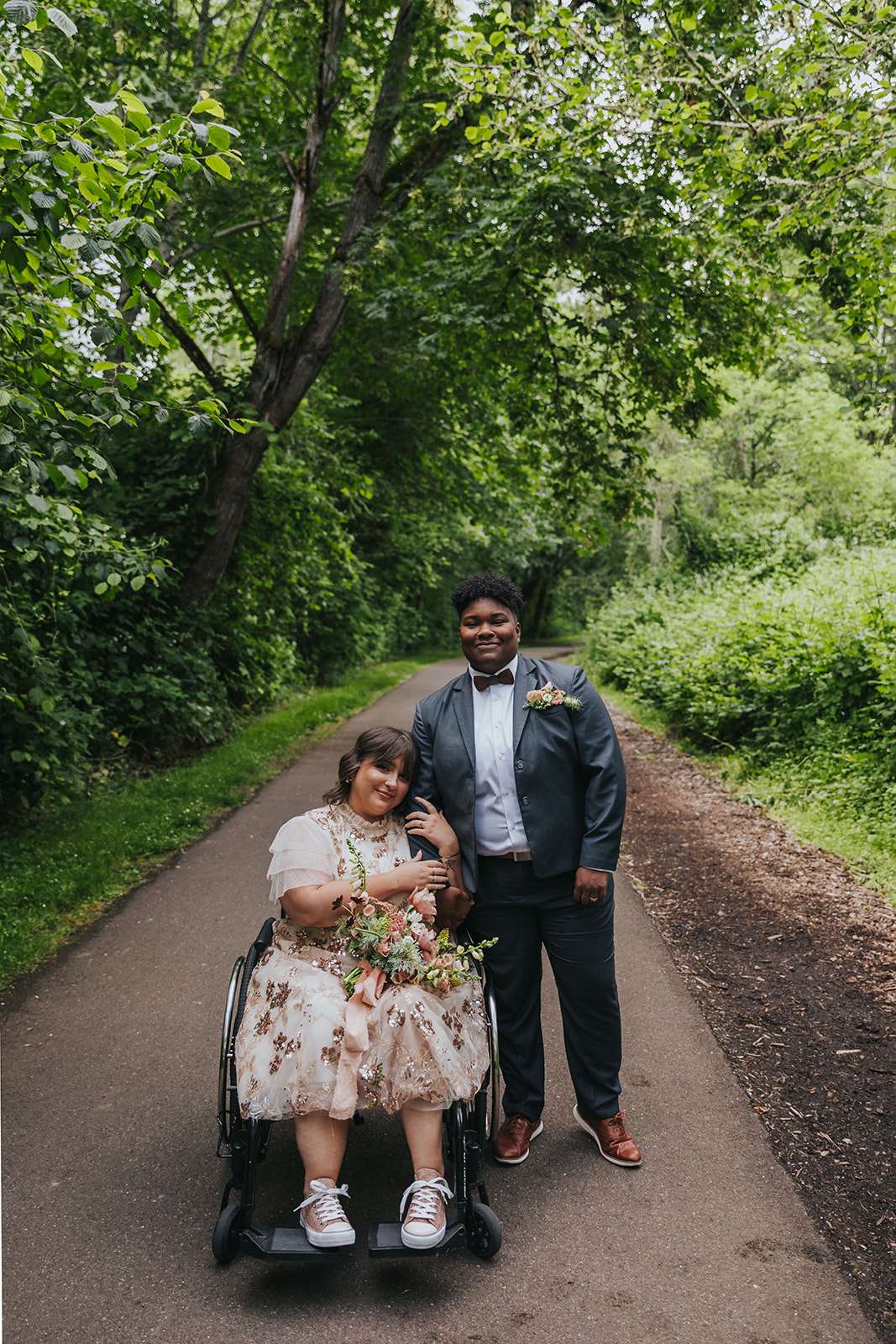
Planning a wedding can be a super stressful time for everyone, but when you have a chronic illness or disability, added stress can also have a huge impact on your physical health. So how do you navigate wedding planning and all the inevitable stresses that it brings while keeping yourself as healthy as possible? Yes, you can take the outlook that most alternative wedding suppliers promote of ‘your day, your way’ and try to make the planning as fun as possible but this only really is the first step when you have a long-term condition.
Planning a wedding often brings a heavy mental load. Social expectations, dealing with family members you’ve set boundaries with, constant decision-making, financial pressures, accessibility concerns, and the demands of venue and supplier meetings can all contribute to burnout or even trigger a relapse. These stressors are part of the process and they can’t be fixed by a simple ‘your day, your way’ mindset, though that outlook can still definitely help!
Many of the challenges that come with chronic illness or disability simply aren’t on the radar for those who haven’t lived them, which means they’re rarely talked about, especially in the wedding world. Support for disabled or chronically ill couples during the planning process is still seriously lacking. That’s exactly why I’m sharing this: because I’ve been there, and I know first-hand that just a few simple changes could have saved me so many recovery days when I was planning my own wedding.
I am a wedding planner and the founder of Quirky Weddings, as well as the director of Unconventional Wedding – both focused on creating a more inclusive and accessible wedding industry, I also live with a chronic condition in the Ehlers-Danlos family called Hypermobility Spectrum Disorder (HSD), along with Postural Tachycardia Syndrome (POTs), and I’m an ambulatory wheelchair user. So, when I talk about planning a wedding with a chronic illness or disability, I’m speaking from both professional experience and lived reality. I know the joy, the stress, and the overwhelm. I’m here to help you navigate it all in a way that works for you.
You’re not alone, and it is possible to have the wedding of your dreams without sacrificing your health while planning it.
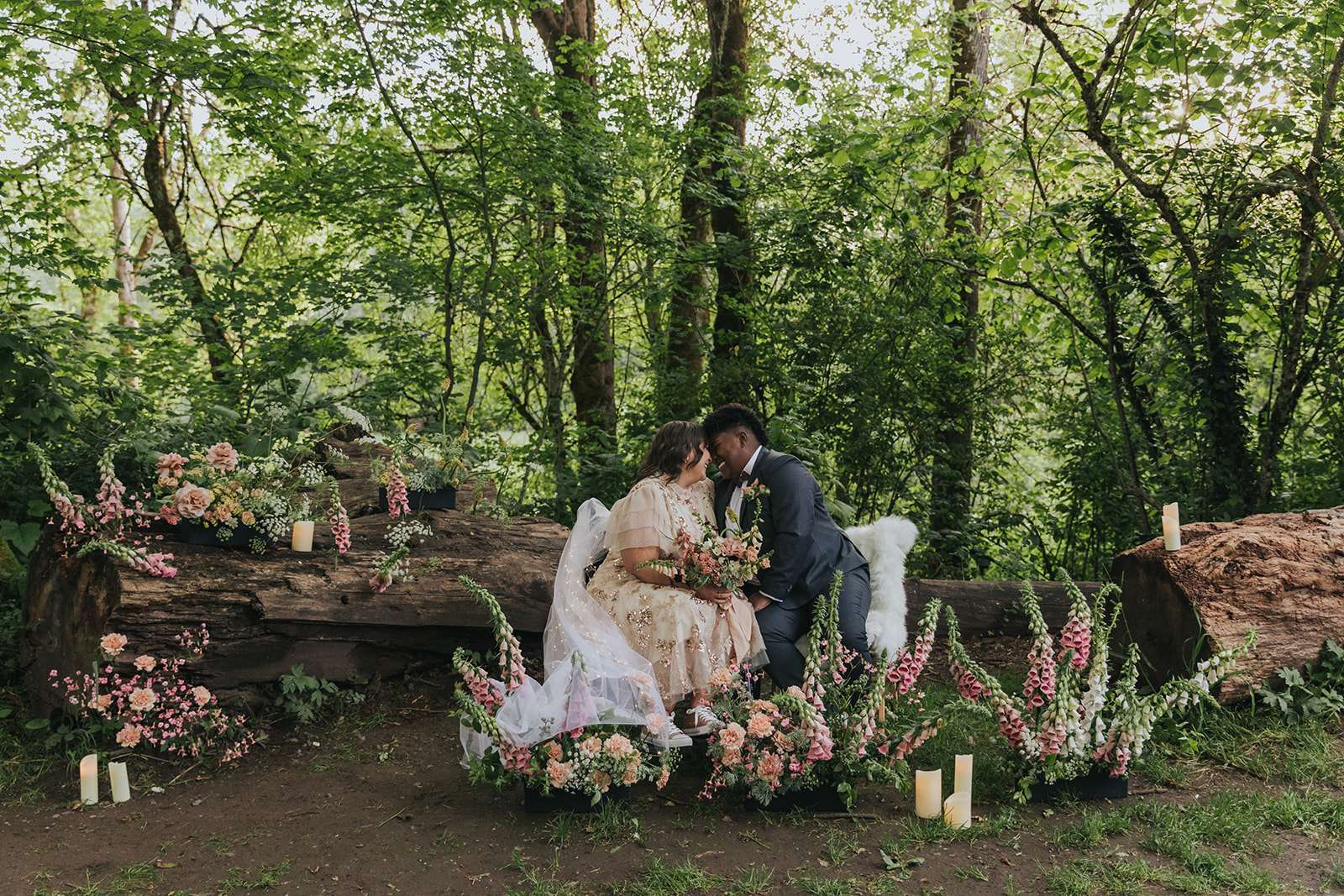
Permission to Prioritise Yourself
Let’s start with the number one most important thing – your health always comes first! You take priority during this whole process and that is non-negotiable! Give yourself permission to prioritise yourself and your health. If you’re like me and you always try to put others first then you might need to write this down and stick it somewhere prominent in your house before you even step foot into wedding planning. Your partner also needs to be on the same page (although I’m sure they are already!) so make sure you have that conversation together. Talk about how this day needs to be built around your needs and your health – there is no point in planning a wedding for yourself if it’s going to put you in the hospital.
One of the most powerful things you can do during wedding planning is to really tune into your body – your energy levels, your limits, and what feels good (or doesn’t). Some days you’ll have more capacity, and others you might need to cancel everything and rest… and that’s okay. Pushing through might feel tempting (believe me, I know!), especially when there’s pressure to make everything “perfect,” but honouring your needs isn’t a weakness, it’s smart planning. Your comfort and wellbeing deserve just as much space as any other part of your day. One tool I’ve found really helpful with my everyday pacing that has helped me to understand what uses my energy is my visible band. It’s like a Fitbit but for pacing and fatigue and is created completely for those with chronic and long term conditions.
A final note on prioritising yourself – setting boundaries isn’t about missing out. It’s about making space for what truly matters. Choosing what works for you isn’t a compromise; it’s an act of self-love and empowerment.
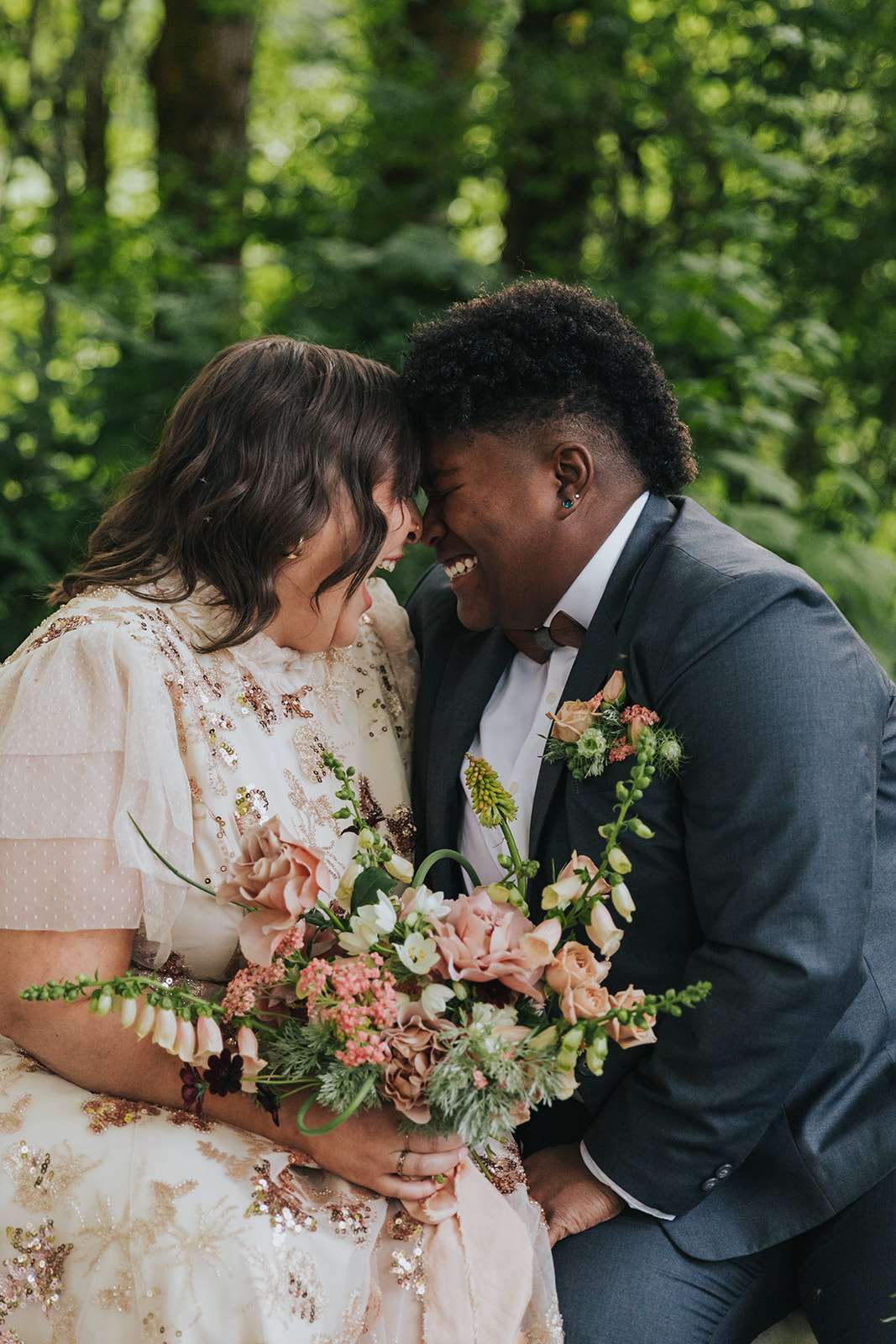
Choosing the Right Support System
Now more than ever is when you need to surround yourself with the people that know you, know your condition and know when you need to be told to take a break. A supportive partner, family, or group of friends can make all the difference, not just by pitching in with tasks, but by truly listening to your needs, advocating for you when needed, and reminding you that your wellbeing is a priority.
If you’re used to doing everything yourself, delegating can feel uncomfortable (I admit, that is definitely me!) but I’ve learned that it’s essential when managing limited energy. Identify what parts of the planning actually needs you, and then pass off the rest to people you trust, whether it’s organising RSVPs, wrangling suppliers, or being your go-to person on the day. Clear communication and checklists go a long way in keeping everyone (and your energy) on track.
Choosing Inclusive, Empathetic Suppliers
Your wedding suppliers are such a big part of your planning journey, so it’s important to choose people who get it. You deserve to work with suppliers who are inclusive, open-minded, and happy to make adjustments without making you feel like a burden. If someone dismisses your access needs, makes assumptions, talks over you, or only addresses your partner – that’s a huge red flag. I’ve been there before when I’m in my wheelchair and they refuse to address me directly, even when talking about me! Sadly even in this day and age there are still people out there like that!
The right suppliers will listen, respect your boundaries, and be just as excited about creating a day that actually works for you. They will come up with creative ideas to solve problems around accessibility and these are the people you want by your side on the day. The photographer who will check in with you to see if you need to sit down, the wedding planner who will bring you a drink without you even asking for it, the hair and make-up artist who will plan in breaks for you to get up and move around. These are the people you want to surround yourself with and you shouldn’t stop searching until you find them – they are out there, I promise!

My Four Big Accessible Planning Tips
1. Take time to consider your venue
Your venue sets the tone for the whole day, so it’s worth making sure it actually works for you and your guests. Think about physical access – step-free routes, lifts, accessible toilets, nearby parking or drop-off points – but also consider things like space to rest, quiet areas away from the crowd, and whether the layout allows you to move around comfortably if you use mobility aids.
Don’t be afraid to ask detailed questions and always request a site visit – a good venue will be happy to help. Sadly a lot of venues still don’t list their accessibility on their website and believe me, I’m working my butt off to get them to start doing it! Make sure you ask these questions before you make the trip down to see them – conserve your precious energy! A lot of venues say they are accessible because they are ‘all on one level’ which makes sense to someone without lived experience of disability, but when you get there, all the paths are gravelled which makes it literally impossible to manoeuvre yourself in your wheelchair without the help of Iron Man! These are the sorts of things you need to be asking venues right off the bat. The right venue for you and your needs is out there so don’t settle for the steps and hope you’ll manage on the day – it’s your wedding day and you are the priority!
2. Work on your timelines and pacing
Weddings can be full-on, so building in breathing space is essential. Spread things out if you need to – a ceremony one day and a relaxed meal the next can be just as special (and way more manageable) than cramming everything into one exhausting whirlwind. Schedule in breaks, allow buffer time between key moments, and don’t be afraid to trim down the timeline so you can actually enjoy your day instead of pushing through it.
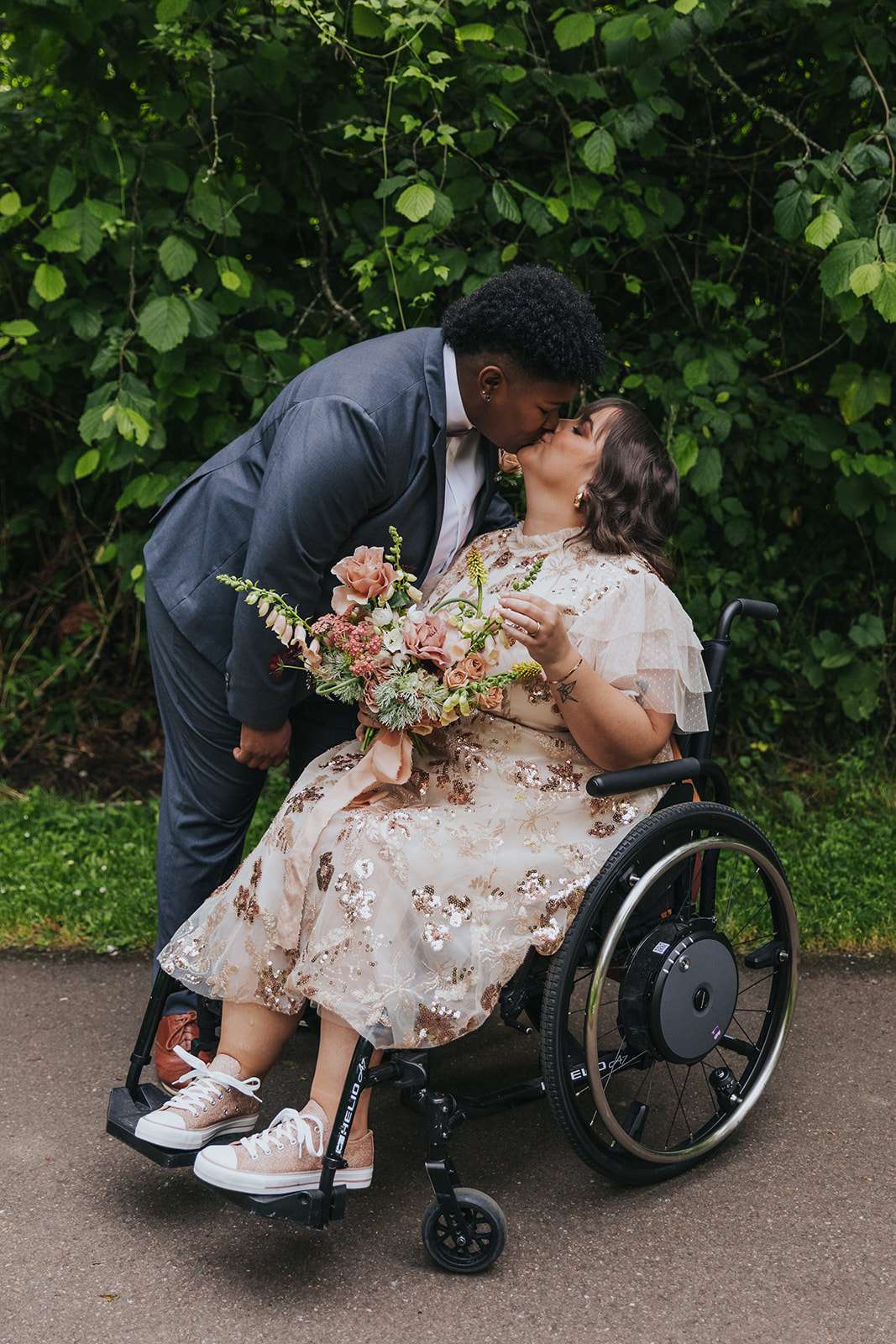
3. Make sensible clothing choices
Wedding outfits should make you feel amazing and let you breathe, move, sit, or lie down if needed. I remember when I was trying on wedding dresses and commented about how comfortable one was, I was told by a member of my family that ‘beauty is pain.’ It absolutely is not! Don’t get dragged into this outdated view!
Look for adaptive or easy-wear options if dressing is challenging, and don’t be afraid to ditch traditional styles if they don’t work for your body. My best piece of advice to make sure your outfit not only works for you but is the fairytale you dreamed of, is to go to a dressmaker and get it custom made. If there is ever a time in your life when you can splash out on custom, it’s now! Dressmakers have so many ways that they can adapt your outfit to your needs without compromising on style and that’s something that bridal stores and ‘off the rack’ sadly just can’t do.
Don’t forget about the accessories, and not just the pretty ones! Comfy shoes, cooling packs, compression gear, soft fabrics – they all make a difference. Whether you’re rocking a jumpsuit, a suit with stretch, or a custom gown with hidden supports, your comfort matters just as much as your style.
4. Prepare for everything
Having a just-in-case plan can be a total game-changer. Pack an emergency kit with meds, water, snacks, mobility aids, cooling sprays, heat packs – whatever helps you feel more in control. Think through what you might need if a flare up hits on the day and make peace with having a plan B (or even C). Whether that’s someone to step in and handle things, a change of clothes, or a quiet place to lie down – knowing you’ve got options can help ease anxiety and let you stay present. Hopefully you won’t have to use them but my favourite phrase comes into play here – future me will thank me!

Communicating Your Needs Without Guilt
Talking about your access needs shouldn’t feel awkward, but let’s be honest, sometimes it does. Remember, you’re not asking for special treatment, you’re asking for what you need to fully take part in your own wedding, which is entirely reasonable. You get to choose how much you share and with whom. It’s okay to be open about your needs without disclosing your full diagnosis or medical history. For example, saying “I have a condition that affects my energy levels, so I’ll need to pace myself on the day” is perfectly valid and sets a clear boundary without going into detail. Your comfort and dignity come first, always.
Your Wedding, Your Rules
It’s okay to grieve the version of your wedding you once imagined – especially if chronic illness or disability has changed what’s possible. But letting go of that ideal doesn’t mean settling; it means making space for something that truly reflects you. It’s easy to get caught up in comparison – scrolling through picture-perfect weddings on social media or feeling pressure to meet ableist expectations – but the truth is, there’s no one right way to get married.
A laid-back garden ceremony with mobility aids and lots of seating can be every bit as magical as a glitzy ballroom event. The quiet moments, the unconventional choices, the parts where you feel seen and supported – that’s where the joy really lives. So please, give yourself permission to plan a day that fits your body, your energy, and your love story. Because weddings aren’t about performance or perfection, they’re about celebrating your love for each other and you deserve to experience that fully, exactly as you are.
If you’re like me and your life revolves around list-making, I’ve created an Accessible Wedding Planning Checklist for you to download and if you ever need any support, advice, recommendations or a general venting session – my inbox is always open!
You’ve got this! Now, go and plan your dream day!
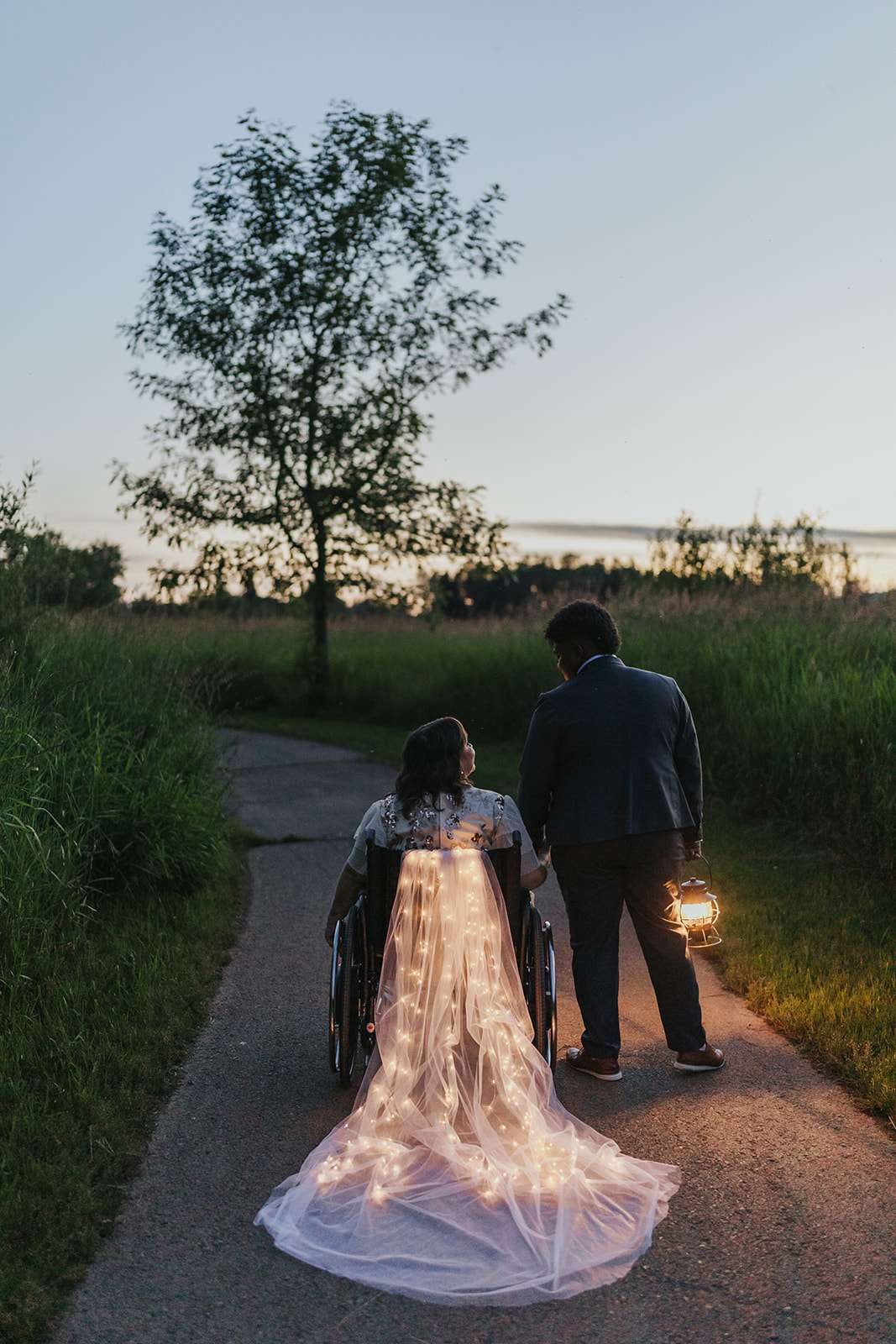
About the Author
Lily Jones is a multi award-winning wedding planner and stylist, the founder of Quirky Weddings and director of Unconventional Wedding. Lily continues her mission to shake up the wedding industry – making it more inclusive, accessible, and fun for everyone. She works closely with wedding businesses to promote a ‘your day, your way’ ethos, while also championing zero-judgement, inclusive practices across the industry, with a particular focus on accessibility for disabled couples and suppliers.
Suppliers
- Photography: Marissa Solini Photography
